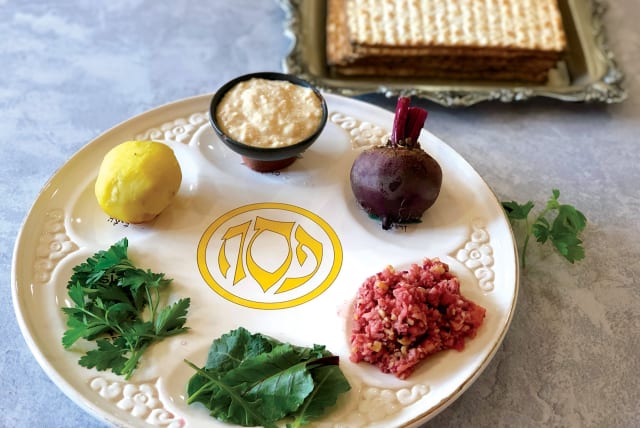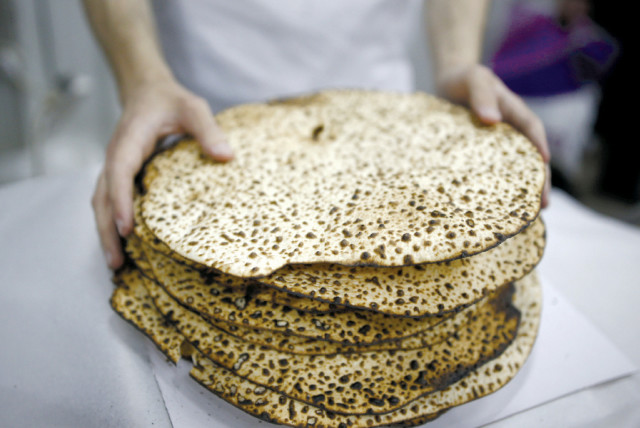Passover as a reminder we must win war, stop national divisions and build a future - opinion

We didn’t need to ask Mah Nishtanah, why is this night different? Jews worldwide felt the added burden this Passover.
At Seder, breaking the matzah broke me. Cracking our Ashkenazi-style, brittle, middle matzah for Yachatz – division – then hiding half of it, while leaving many fragmented crumbs behind, felt too literal. So many Israeli families are broken; so many beautiful souls are hidden, damaged, or lost forever, victimized by the Hamas-Hezbollah-Iranian evil.
We didn’t need to ask Mah Nishtanah, why is this night different? Jews worldwide felt the added burden this Passover. We struggled to be joyous amid so much terrorist-imposed suffering. We wanted to respect this moment’s solemnity without spinning out into divisive politics, depressive mourning, or speculative dooming-and-glooming.
Our matzah’s fragility reinforced our unhappy historical throwback. Hamas’s vicious attack, the Palestinians’ and Progressives’ sadistic joy as we suffered, Israel’s grueling multi-front war, the Jew-hating surge, the demonizing of Israel, topped by Iran’s April 13 barrage, risked returning us to the historical state the State of Israel hoped to end: permanent Jewish fragility.
We grew up watching Fiddler on the Roof, grateful that we dodged such Jewish precariousness. Jewish vulnerability was yesterday’s news, a relic from the medieval world of Black Deaths and the 20th-century world of whooping cough and polio. We weren’t fiddling on some pointed gable; we fiddled about while feeling rooted, as Jews born into freedom and prosperity.
Jews living in liberal Western democracies trusted our post-Auschwitz covenant with our non-Jewish neighbors. They had learned, we decided, that Jew-hatred is the Jew-hater’s affliction, menacing Jews and non-Jews alike – an anti-democratic plague everyone must resist. Jews living in Israel trusted our most precious resource, our soldier-kids, led by heroic generals and responsible politicians, to defend us from hostile neighbors.
History on our side
History seemed to be on our side. Since the Yom Kippur War 50 years ago, we surfed from miracle to miracle: Israel won and the Arab surprise-attackers lost; the Refuseniks escaped and the Soviet Union collapsed; Israel prospered and made peace with Egypt, Jordan, the UAE, and Morocco.
Our enemies want to rob us of our joy, to make Israel feel unlivable. Alas, on October 7 in the Gaza corridor, every day since up North, and on the crazy night of April 13, they came closer to succeeding than they have in decades.
We’re still stuck mid-drama. We remain at war with Hamas in Gaza, Hezbollah up North, Palestinian terrorists in the territories, and Iran with its many proxy armies long distance. And, because we dared defend ourselves, we see campuses and downtowns worldwide occupied by hoodlums, shouting bloodthirsty, Jew-hating, genocidal slogans – as too many “good people” scurry about their business, consulting Google Maps to bypass the unpleasantness.
Still, we had a job to do this Seder – which continues through Passover and beyond. Matzah is not just “the bread of affliction” and “the bread of poverty.” The Zohar also calls Matzah “the bread of faith” and “the bread of healing.” Indeed, that broken half transformed instantly from a fragment into the magical Afikoman – the dessert, the after-party, the treasure hunt that makes us all kids again.
The Seder reenacted the eternal Jewish playbook, our recurring arc from negative to positive, from suffering to redemption. Finding the afikoman-fragment, we made ourselves whole and rejoiced, ending the Seder in song.
Passover resets our three-pronged agenda.
• First, we must win these wars – on all fronts. October 7 showed what victory looks like to them. We can see at Columbia, Yale, and other campuses what victory looks like to them abroad. Inflamed by their sick contact high from burning American flags, they stop singing “Oh Hamas, our beloved, strike, strike Tel Aviv,” just long enough to tell Jews “go back to Poland” and you’re next to be “flooded.”
• Second, we must stop being so divided. For Passover’s 7th day, when no families risk Seder Wars over religious or political differences, let’s accept a unity challenge. Can every right-winger thank Joe Biden for supporting Israel since October 7 and on April 13, while thanking Gadi Eizenkot, the reservist fighter pilots, and countless other anti-Bibi protesters for building our impressive defenses and executing them flawlessly? Can every left-winger thank Donald Trump and Bibi Netanyahu, for orchestrating the Abraham Accords which created a global coalition operating a joint command that cooperated seamlessly for Israel when Iran attacked? We should then all join, left and right, in denouncing our enemies: Hamas and its enablers, every Palestinian terrorist, Hezbollah, the Houthis, the Iranian dictators, and the Poisoned Ivy Leaguers who menace pro-Israel students while cursing America and the West, not “just” Israel and Zionism.
• Third, we can’t stop singing and dancing, healing and believing. Last Friday, I attended a Simhat Bat, celebrating Yakira Nili’s birth; a brunch with 70 people included eight other babies born in Israel since October 7. Every smile, every baby born, every holiday celebrated, every marriage consecrated, heals us, rebuilds us, and helps us dream about a better tomorrow.
Don’t blame Zionism for not eliminating antisemitism – that’s the Jew-haters’ fault. Zionism gives us the grit to fight when necessary and rejoice always. Jewish history reminds us that Jews have faced steeper odds with fewer resources – or friends – worldwide. And Judaism gives us Matzah.
Passover’s matzah-eating-fest consecrates every precious fragment, treating none of our people as crumbs to sweep away – or abandon. So with each bite of matzah, keep chewing and Jewing. Have faith, start healing, and feel the power of a forever-people who keep mainlining matzah, year after year, no matter what they throw at us.
The writer is a Senior Fellow in Zionist Thought at the JPPI, the Jewish People Policy Institute, is an American presidential historian and the editor of the new three-volume set, Theodor Herzl: Zionist Writings, the inaugural publication of The Library of the Jewish People (www.theljp.org).
Jerusalem Post Store
`; document.getElementById("linkPremium").innerHTML = cont; var divWithLink = document.getElementById("premium-link"); if (divWithLink !== null && divWithLink !== 'undefined') { divWithLink.style.border = "solid 1px #cb0f3e"; divWithLink.style.textAlign = "center"; divWithLink.style.marginBottom = "15px"; divWithLink.style.marginTop = "15px"; divWithLink.style.width = "100%"; divWithLink.style.backgroundColor = "#122952"; divWithLink.style.color = "#ffffff"; divWithLink.style.lineHeight = "1.5"; } } (function (v, i) { });

